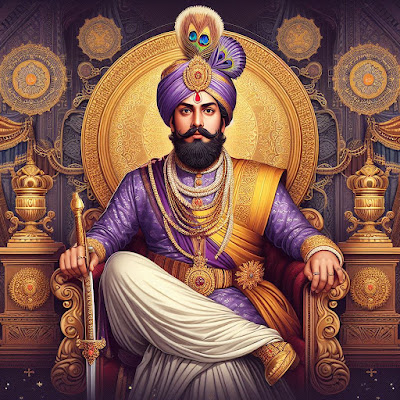Chhatrapati Shivaji Maharaj
- Name: Shivaji Bhonsle
- Date of Birth: February 19, 1630
- Birthplace: Shivneri Fort, Pune district, Maharashtra
- Parents: Shahaji Bhonsle (Father) and Jijabai (Mother)
- Reign: 1674–1680
- Spouse: Saibai, Soyarabai, Putalabai, Sakvarbai, Laxmibai, Kashibai
- Children: Sambhaji, Rajaram, Sakhubai Nimbalkar, Ranubai Jadhav, Ambikabai Mahadik, Rajkumaribai Shirke
- Religion: Hinduism
- Death: April 3, 1680
- Seat of Power: Raigad Fort, Maharashtra
- Successor: Sambhaji Bhonsle
- Chhatrapati Shivaji, also known as Shivaji Bhonsle, and was a formidable warrior who battled the Mughals throughout the 17th century. He was born on 19 February 1630, at the Shivneri Fort, which is currently located in Maharashtra. His father, Shahaji Bhonsle, served as a general in the Bijapur Sultanate, while his mother, Jijabai, was known for her devout religious beliefs.
- Chhatrapati Shivaji Maharaj was a prominent and respected figure in Indian history, especially in Maharashtra. He was born on 19 February 1630, at the Shivneri Fort in Pune, India. Shivaji Maharaj is renowned for his exceptional warrior, leader, and visionary accomplishments.
- Shivaji Maharaj is renowned for founding the Maratha Empire, which significantly impacted Indian history in the 17th century. He started his career by opposing the repressive rule of the Adil Shahi and Mughal dynasties, eventually establishing an autonomous kingdom in the Western Ghats of India.
- His military efforts, marked by strategic insight and guerrilla warfare techniques, allowed him to increase his area and strengthen his control. Shivaji Maharaj was a proficient military leader and a sage administrator who introduced inventive administrative and military changes in his realm.
- Shivaji Maharaj is best remembered for promoting the concepts of "swarajya" (self-rule) and "Hindavi Swarajya" (self-rule for Hindus). He advocated for Hindu sovereignty and against religious prejudice and tyranny. He ruled with religious tolerance and respect for other cultures and beliefs.
- In addition to his military and administrative accomplishments, Shivaji Maharaj was recognized for his progressive policies, which involved advancing agriculture, trade, and commerce and establishing a formidable naval force.
Battels Fought:
Battle of Pratapgad (1659):This battle is one of Shivaji Maharaj's most famous victories. He successfully defended the Pratapgad Fort against the Adil Shahi forces led by Afzal Khan. Shivaji's tactical genius and the bravery of his soldiers turned the tide against the more significant enemy force.
Battle of Kolhapur (1659):
Following the Battle of Pratapgad, Shivaji Maharaj launched a counter-attack on the Adil Shahi forces, defeating them decisively near Kolhapur.
Siege of Panhala (1660):
Shivaji Maharaj's forces laid siege to the Panhala Fort, held by the Adil Shahi governor Siddi Masud. Despite facing a well-fortified position, Shivaji's perseverance and strategy eventually led to the fort's surrender.
Battle of Purandar (1665):
Shivaji Maharaj faced the combined forces of the Mughal Empire under the command of Mirza Raja Jai Singh and the Adil Shahi Sultanate. Despite initial setbacks, Shivaji negotiated a favorable treaty with the Mughals, known as the Treaty of Purandar, which allowed him to retain control of most of his territory.
Battle of Sinhagad (1670):
This battle was fought between Shivaji Maharaj's forces and the Mughal army led by Aurangzeb's son, Shahista Khan. Shivaji's forces successfully defended the Sinhagad Fort, inflicting heavy casualties on the Mughal army.
Battle of Wai (1673):
Shivaji Maharaj's forces clashed with the Mughal army near the town of Wai. Despite being outnumbered, Shivaji's tactical brilliance enabled him to defeat the Mughals and capture their artillery.
Other Important Facts:
- He was born during the Mughal era in India.
- He opposed the Mughals and established the Maratha Empire.
- He was known for his guerrilla warfare tactics.
- He was bestowed with the title of Chhatrapati in 1674.
- He passed away in 1680 at the age of 50.
- He is regarded as one of India's most formidable warriors and influential commanders.

.png)

